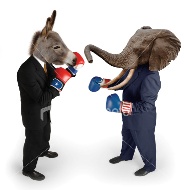The social consequences of the health care reform bill


This has been especially evident this morning, as many people in my various social networks took to the Web to express their cheers or dismay, filling my feeds with sometimes pompous, sometimes hostile expressions regarding the heated health care topic.
For those people with only friends and family in their social networks, this might not be as much of a consideration. It's their social network profile and theirs to do with what they wish. For many others who connect to professional contacts, the gloves have still come off. It appears that opinions on this topic are so heated that for many, professional considerations be damned. This is a case in which opinions need to be expressed.
But is social network expression worth the cost of damaged professional perception? Regardless of which side of the health care reform debate I sit on, it doesn't make me feel good to see those folks with whom I do business chastising others for being "unAmerican" or telling others to get out of the country if they don't like it. It shows an immature side of an otherwise very pulled together and professional person to resort to name-calling and online flagellation. Freedom of expression is a right I'm very happy to have and would never tell someone else to stop expressing how they feel, but when one expresses their political leanings so vehemently in a public forum, that person also has to be willing to accept the consequences.
I spoke with a woman named Cheryl Mackie this morning who reached out for advice on how to best deal with being crushed by an opposing viewpoint on health care reform. "This person is a partner in the company we hire to consult," she said. "How do I not think of this every time I work with him?"
When digging in a little bit deeper, Mackie didn't care so much that her social network connections didn't agree on the matter, but cared about how brutal they were being to one another.
"I see people discuss all kinds of topics and keep it both healthy and professional," she said. "Even during the presidential elections it stayed respectful. But this is ugly and it's making me uncomfortable."
Mackie's experience is no different than that of many others -- including my own. Just this morning I hid the feeds of three people who I consider to be professional contacts and friends, merely because of their hostile behavior towards those who disagreed with them on the health care issue. Interesting to note is that these people were on varying sides of the argument. It was the behavior that was causing an issue. Will this cause me to lose long-term professional respect? Only time will tell, but when I see a person acting disrespectful toward another professional contact over any matter, that makes me think that person may not warrant respect in return.
In truth, talking about politics in such a heated way on a social network should be given the same consideration as talking about politics in the work place. Would you barge into your colleague's office and call him or her a Socialist in the middle of the work day? Likely not, if you want to keep your job. In a 2008 article from the BusinessWeek "Ethics Guy," Bruce Weinstein offers good advice for keeping heated political discussions respectful in the workplace, if one has them at all. On a base level, he offers the following five ethical principles:
- Do No Harm
- Make Things Better
- Respect Others
- Be Fair
- Be Loving
Good advice, but unfortunately I've seen a violation of all of these principles today, entirely on social networks. What have you seen? And what do you think? Take the below poll.
[poll=12]